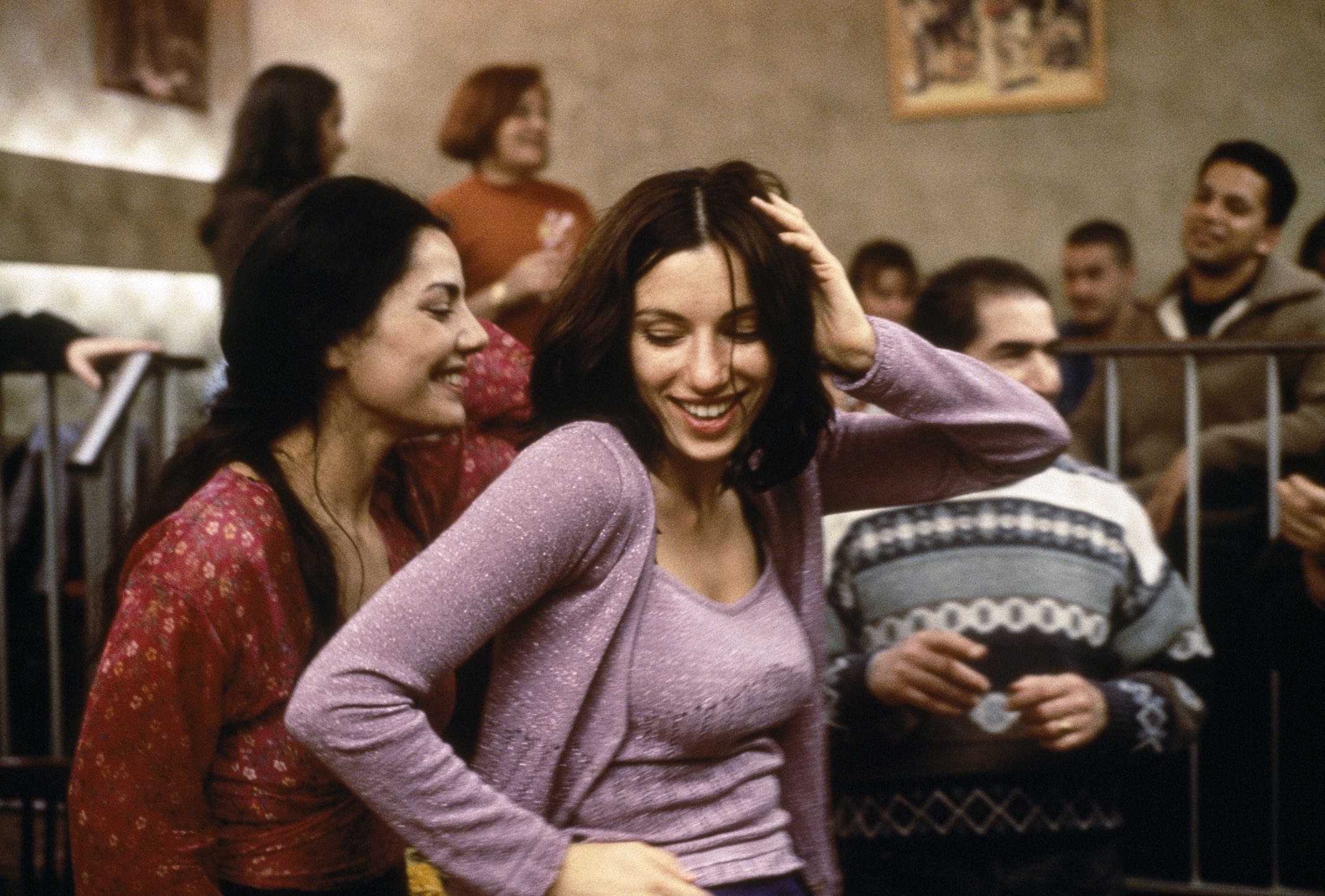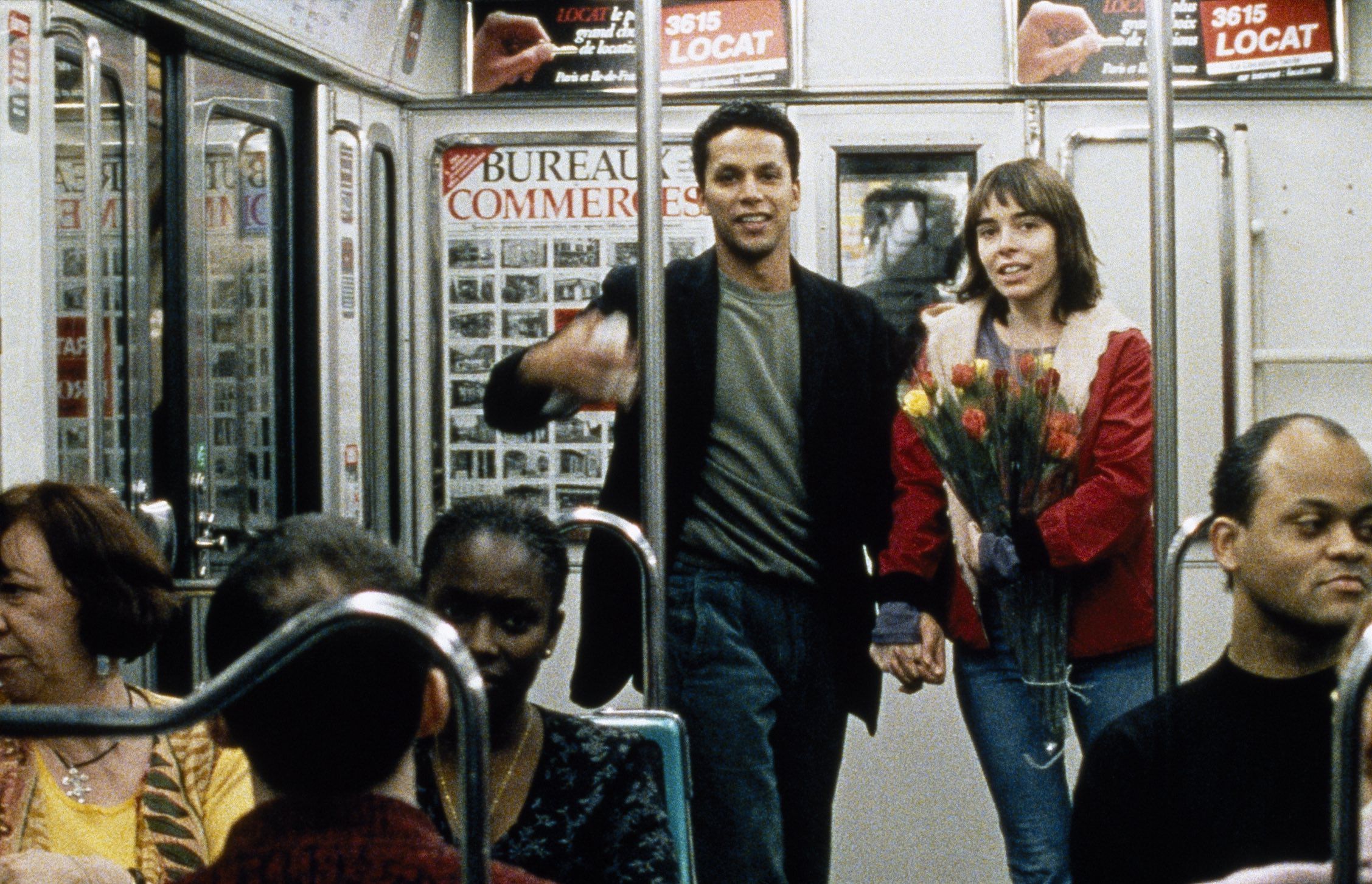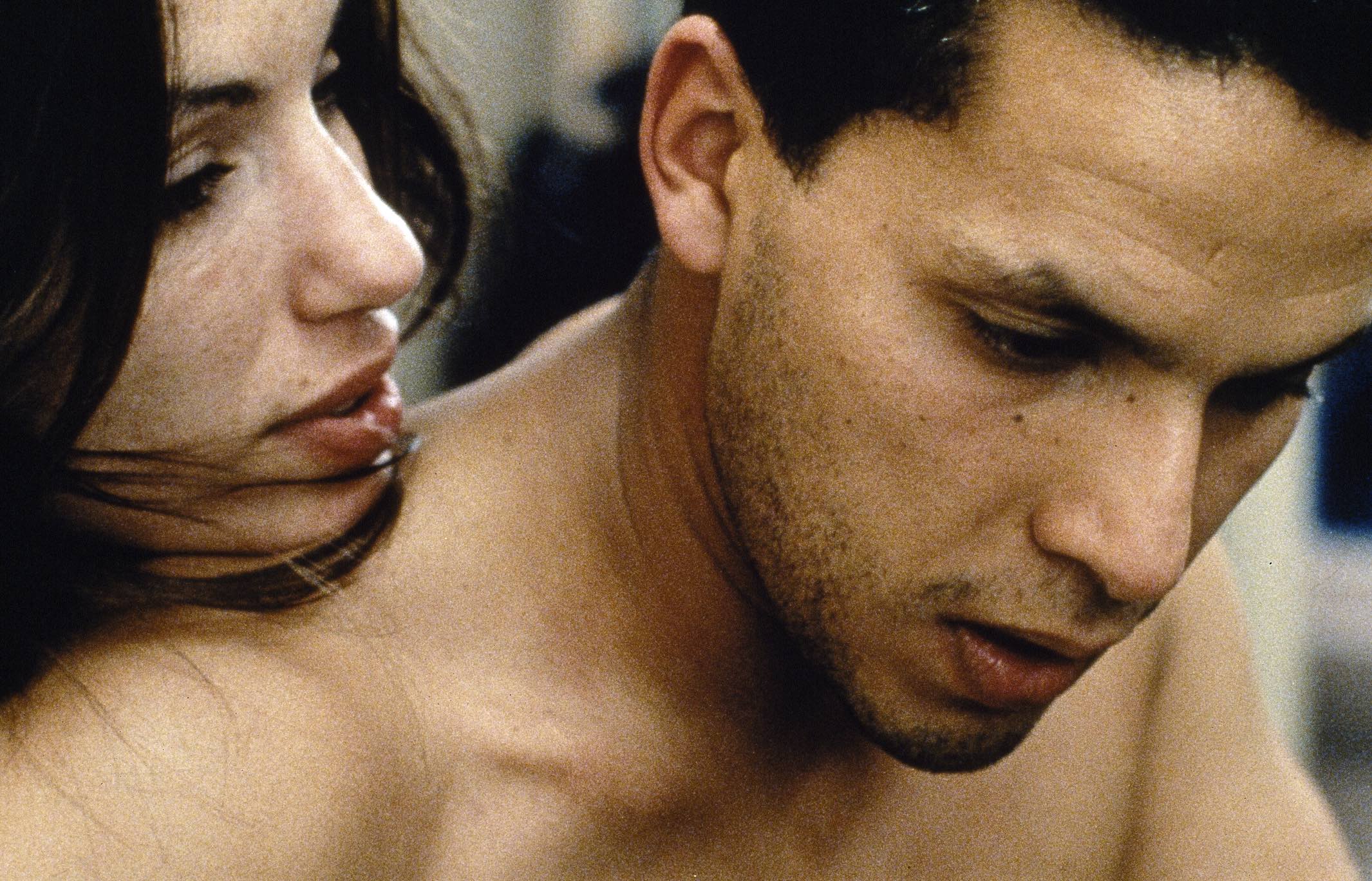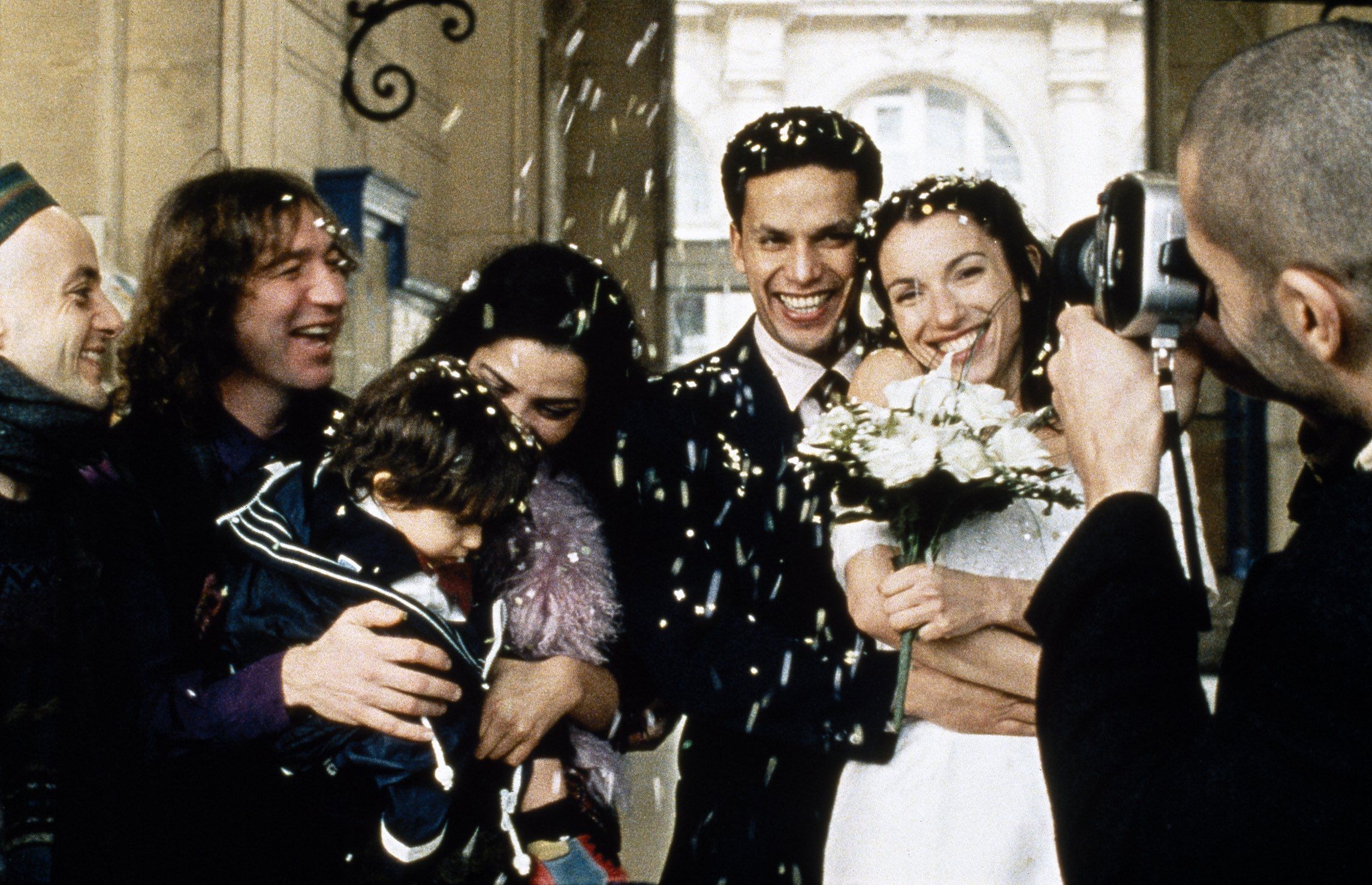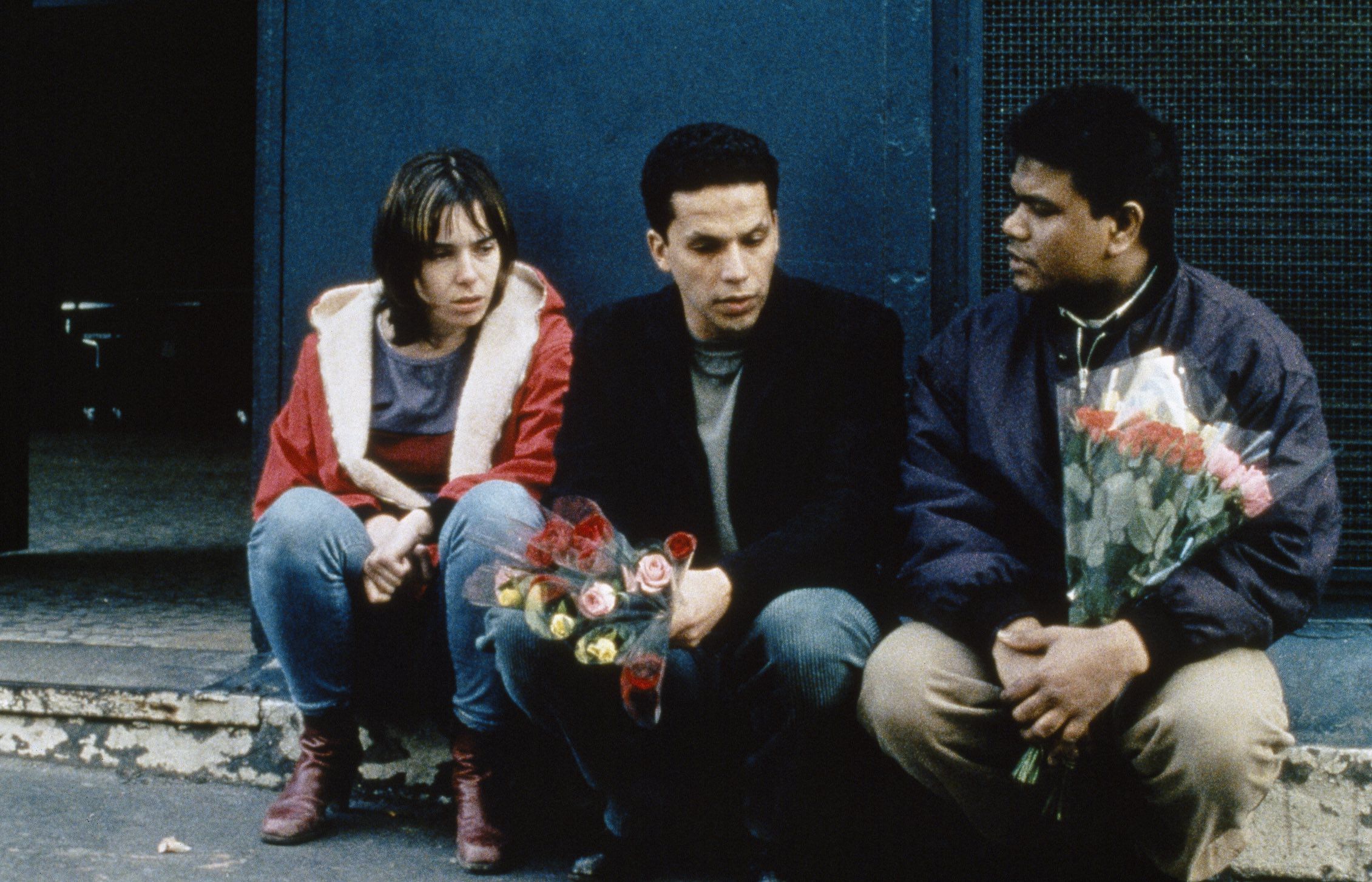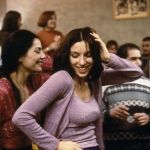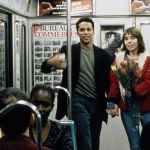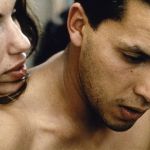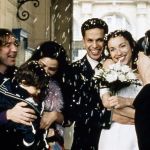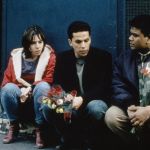REVUE DE PRESSE
interview aure atika concernant LA FAUTE A VOLTAIRE-610
The character of Nassera is the very contrary of the parts that we have seen you in until now. What […]
Interview de Sami Bouajila concernant LA FAUTE A VOLTAIRE-608
What made you accept the part of Jallel ? I had heard about the project because Abdel had already been […]
Interview d'élodie bouchez concernant LA FAUTE A VOLTAIRE-609
What was your first contact with the story and the character of Lucie ? I immediately wanted to be part […]
Interview d'Abdellatif Kechiche-607
What made you want to make this film ? Above all, for a long time, I had wanted to make […]
Interview de Abdel KECHICHE concernant LA FAUTE A VOLTAIRE-597
Comment vous est venu le désir de faire ce film ? J’avais avant tout et depuis longtemps, un désir de […]
interview aure atika concernant LA FAUTE A VOLTAIRE-610
her ?
First of all, I found the screenplay to be very good, very well written. The characters race towards each other. Jallel and Nassera meet, in the middle of the page they discover that they are cousins and, at the foot of the page, there's a party in the café! In a single page, the characters exchange a great deal. This is a powerful current that can carry along both the actor and the audience. In real life, things never happen so simply. That's why we love and admire these characters.
While I don't like showing my wounds in real life, I seek that out above all in the cinema. Nassera gave me the chance to express them. She's a rich character who can be interpreted in two ways. At first sight, we only see her wounds and her difficult past. She is fairly timid, wild almost, but life has mistreated her innocence. Moreover, I liked the idea of playing a second-generation Arab immigrant. I wanted to get closer to my roots.
We don't know you in this register…
True, this part is fairly different from all those that I've been seen in until now but I have nonetheless played "serious" parts in films that unfortunately weren't hits. As a result, audiences only remember my parts in comedies but I find that image rather limited. I was brought up in a film-loving world. As a child, before my tastes were formed, I was taken to see auteur films. At seven, my mother was showing me films by Philippe Garrel! Even if I did discover a more popular form of cinema later, I still feel close to that kind of cinema and want to return to it.
Abdellatif Kechiche has clearly directed you in a highly personal manner. How did you tackle this part with him ?
Abdel is the best director of actors that I have ever come across. However, the shoot wasn't easy and it was his first film. He is constantly attentive to his actors. When you feel esteemed, loved and desired as an actress to that extent, you can only surpass yourself. Abdel drove me into a corner, towards my true nature.
So you feel that you have some things in common with the character ?
I recognize myself completely in Nassera. We don't have the same past, of course, but her way of showing her wounds and expressing them brings me closer to her. I can also understand the impulsive side to her, her sudden mood changes and the trouble she has in getting her emotions across.
Nassera crystallizes Jallel's desire to settle down, to feel safe and protected by marriage. But, in the end, she is the one who feels threatened and flees…
Nassera has had a man in her life, he has left and she has never got over it. She can't stand the idea of being abandoned again. When her son disappears, she sees it as a very brutal warning: "if you don't want to lose what you have and suffer for it, don't try to own anything." And so, rather than risk a break and being abandoned again, she herself cuts the thread that leads her along the path to a new form of possession. No possessions, no loss. It's a simple but radical solution.
She is a character who is afraid, despite appearances. Afraid for her child, afraid of suffering. Behind her sensual and outgoing appearance, she is very timid and wary. Her past haunts her. Her child is a trace of this past and she cannot prevent herself from seeing his father in him which explains why she speaks so harshly to him. On the other hand, this child is her sole reason for living: she works and tries to pull through for him. They have a passionate relationship which doesn't leave much room for Jallel. They could have loved each other but she needed time to gain trust and be tamed.
You have put a great deal into this part which is an opportunity for you to show where you'd like your acting career to take you…
I hope Abdel won't make any other films without me! I like the way in which he always links his ideas to life, flesh, the body and sensations. That's the beauty of the film. On the set, everything was geared towards the actors. We'd see things through to their logical conclusion, notably in the long single takes that could last up to ten minutes! Unlike many sets, there was never any frustration at not having done the maximum. When it comes down to it, this kind of film comes more naturally to me than comedy. Above all, I try never to fall into a rut.
Interview de Sami Bouajila concernant LA FAUTE A VOLTAIRE-608
I had heard about the project because Abdel had already been working on it for a while when he offered me the part. I thought that the screenplay was magnificent and I was impressed by the narrative power of his writing.
How did you prepare for the part ?
We talked about Jallel during long meetings that were a way of discovering each other, of comparing our two visions of things. Abdel soon made me understand that he didn't want a premeditated acting style, aware of its effects. On the contrary, he wanted me to free my body and spirit and open up to the different sensations that the character could feel. We defined a large number of elements together but not in the usual meaning of the expression. For Abdel, we needed to leave room for Jallel. The film was sufficiently well written and the characters clearly enough defined to make us as available as possible. He solicited us continually but imposed nothing on us.
What is the meaning of Jallel's experiences for you ?
The character of the illegal immigrant is a pretext to go beyond physical borders and to confront different worlds: Jallel's past, his origins and the rules of life in France. For me, La Faute à Voltaire is a tale or a fable. It's also an initiatory story. The character is confronted with the unknown, with dangers, with realities that he has to adapt to and to which his dreams have to conform. His encounters are decisive. Nassera is a character who is linked to a precise setting, with a job, a confirmed personality and clear aims in life along with the energy that urges her to attain her goals. In the scene where they meet, Jallel attempts to free himself and to communicate. He allows himself to be intoxicated by this woman, the setting, alcohol and poetry: but it's an illusion, a moment of happiness only possible in the café, with the help of drink. But Nassera has both feet on the ground while Jallel is brought down to earth the next day… Despite everything, Jallel is an optimistic character: material obstacles worry him, his situation is an impossible one and yet I find that his vision of things is never less than noble. There is something contemplative and slightly oriental about him.
Some scenes almost seem to be improvised…
While leaving us plenty of scope, Abdel demanded a great deal of rigor from us. That was the only condition possible for us to be free. The director always tried to take into account Jallel's point of view and to adopt his manner of discovering people and places… While sticking close to the screenplay, he was open to all our suggestions. He simply asked us, through the numerous takes, to find the truth and to get as close to it as possible.
Can you talk a little about your partners ?
The two girls, Elodie and Aure, were fantastic. I was over the moon. The irony of all this is that, in the end, during his stay, Jallel has two very powerful and very different love stories.
Interview d'élodie bouchez concernant LA FAUTE A VOLTAIRE-609
I immediately wanted to be part of this story, to be one of the little "fairies" that Jallel would meet on his path. I was touched by the humanity, joy and humour that are given off by the story, the way in which it tackles the different forms of exclusion. I was also charmed by the relationship between Lucie and Jallel, by the way that Lucie has of instantly "recognizing" herself fin Jallel, by her purity and her view of the world, by the way in which she clings to him like a lifesaver. I was touched by her beauty, difference and truth.
Lucie seems to be a lost young woman, incapable of finding her place in society. Yet, at the same time, she has a vital and sensual energy that gives her a form of optimism...
Lucie lives in another dimension, she isn't aware of the social codes that would allow her to fit in more easily. For me, she is something that we'd all like to be a little more often: she can express her needs and desires loud and clear, in an absolute way, without being afraid of the gaze of other people. This is where her life force comes from. She opens Jallel's eyes, making him admit and accept other forms of difference than the one that typifies him.
Lucie expresses her need to love in a physical rather than a verbal manner. It's a fairly unusual acting style, closer to the body than to language, and always on the razor's edge. How did Abdel Kechiche direct you ?
Abdel's demands were constant, without a single second being given over to relaxation or easy options. Everything had to strive towards an extreme level of truth, shedding light on it in the process. He continually helped me to keep Lucie in another dimension, he didn't let me hide behind any filters and he insisted that I remain concentrated virtually 24 hours a day. Abdel was able to bring about true fusion between each of us. We genuinely all acted with each other with the same generosity as our characters.
How does this film fit in with your itinerary as an actress ?
This experience is clearly one of those that you don't forget easily and also one of those that give you bad habits in relation to the extreme demands of a director who pushes back your limits and isn't content to accept what you can give him without trying to go just that bit further.
If you were to retain a single memory of this shoot, what would it be ?
If I were to retain just one memory of the shoot, it would probably be the moment when we shot the dance scene at the end of the film. The light was going, the crew wasn't really into it and we were only allowed a single take. We shot the whole scene with intense joy and solidarity. We were singing like maniacs! And history even repeated itself: during the post-synchronization of the film, Abdel put around ten of us together in a small booth and got us to dance and sing at the top of our voices like crazy! The scene gives me goose bumps when I see it because of the intense joy that it gives off !
Interview d'Abdellatif Kechiche-607
Above all, for a long time, I had wanted to make films. When I started to consider this idea a little more seriously, I came up with a number of projects and this is the one that attracted the most attention. I don't know if it's because people expect immigrant filmmakers like myself to take a position on the subject or if because the moment when I presented it coincided with the filmmakers' movement against the Debré legislation. In any case, the screenplay seemed to come along at the right time and my desire to make this film rather than another was strengthened by the concrete possibility of being able to make it but also in reaction to everything that was being said or done about "illegal" immigrants, the "undocumented" and the "excluded" in general. I felt that there was an overwhelming tendency to limit their identity to their condition and, through mass representation or extreme situations, to dehumanize them. Illegal immigrants are presented as a plague when they are human beings who are aiming for a better life, which is a healthy thing. I told myself that if we could succeed in growing fond of a face, simply by watching it laugh, cry, make friends, love, etc. then we could perhaps have a different view of things.
Did you investigate the way in which homeless people live ?
I visited hostels and groups working with the homeless. You simply have to look around too since our cities are full of people living in such situations. It's easy enough to find someone who'll agree to sit down and tell you their story. I also wanted people from the Emmaus hostel, where we shot the film, to take part and to contribute their experiences but I'm sorry that this wasn't possible without a form of discrimination… What struck me about the hostels is that these places, that were originally supposed to handle people in temporarily precarious situations, have now become genuine institutions that people use on a regular basis. Everything happens as if everyone had accepted the situation: they throw parties… organize games… I find it touching to see people who no longer have families or homes take part in such futile pastimes as the competitions and games organized for them. I also spent a fair amount of time at the Coeur du Dragon, the squat take over by the DAL group on the Rue du Dragon. In fact, the In refusing to make your characters political figures, you thereby avoid any sordid realism…
Original screenplay was linked much more closely to those events and I considered shooting there which proved to be impossible. In the end, I mainly kept everything that escaped the context. I didn't want to make a film with a message or a report that merely observes the facts to link them to ideas.
Moreover, your story rejects any form of demonstration…
I didn't want to fall into the trap of a "film with a message" that often harms the ideas that it is supposed to defend. A political interpretation is of course possible but that doesn't sum up the film. I really wanted to create several different levels of interpretation and so leave the film open-ended with a form close to that old Arab tales that above all symbolize a certain pleasure in the act of telling tales.
This was a decision made from the outset. I didn't want people to feel sorry for Jallel, Lucie and Frank. I wanted to create a certain sympathy and understanding by favouring a more ordinary representation, to shatter the smokescreen of politics and to make people feel close to them. Jallel is a man; he goes towards his fellow men, which is a perfectly natural thing to do. He forms bonds with others, which is an inalienable right. You can't stop people from moving around freely and meeting each other. Moreover, the problems linked to the illegality of his presence in France are never stressed. I wanted people to forget them almost.
In viewing the film, one feels that the technical aspects take a back seat to the actors' performances…
It's true that I use the camera as a means of recording the moments of life that we are able to grasp. That's what fascinates me and motivates me in the cinema: life unfolding within a frame, everything that is possible and that can happen in front of a camera. In fact, one of my major frustrations was that I wasn't able to have a second camera to cover certain shots…
How do you go about directing an actor's performance ?
I focus a great deal of attention on the actors; I need to feel that we're working together. Actually, I'd rather talk about an actor's "contribution" rather than "directing" him or her. I need to establish an affective bond. I don't attempt to direct them or impose things on them. I talk to them about their characters, I try to talk to them about themselves, I'm there to help them bring out what they have inside. The fact of being an actor myself probably helps since everything occurs fairly naturally. Often, the best things are obtained without premeditation, in a flash, in a sort of trance-like state. The work, this exchange that we can have in creating something together, fascinates me.
Do you shoot many takes ?
It's all relative: twenty takes is a lot and, at the same time, very little. You could shoot thousands of takes and find something new each time.
You weren't afraid to use well-known actors who already have a particular image for audiences ?
At first, I was a little worried about that. But I know that once an actor gets caught up in the work and the character, their image and previous roles are soon forgotten. It's a matter of motivation and, on the whole, this happened with all of them and I'm very pleased. But I didn't consider this issue each time: I didn't know Bruno Lochet, for instance. I had never seen Les Deschiens. When I saw his photo, and then when I met him, he matched the character of Frank perfectly. It was obvious. I had no preconceptions about him since I didn't even know that he had been in a film before! Once we started rehearsing, he turned out to be a great actor, and an unbelievably generous guy! It was almost too much to hope for. In a similar manner, I had spotted Aure Atika in a small part in a film that no one had seen, not in the comedies that have formed her image. I was sure that, in working together, we'd attain something.
Tell is a little about Jallel's experiences. Does he really hope to stay and fit in? He seems to live wholly in the present...
He doesn't consider the issue in those terms. This impression of living in the present is linked to his condition. He knows very well, like many illegal immigrants, that he is here for an unspecified period that he cannot control. He cannot really form projects. At first, his sole hope is to make a little money and help his family, however long that may take. Then, little by little, he forms ties and grows fond of France. It's a subconscious process. He doesn't think, "I know, I'll fit in…" It occurs naturally. In Jallel's case, he barely has time to become aware of it before the experience comes to a sudden end and prevents him from living out his new love affair.
The two female characters, Nassera and Lucie, have to deal with the fact of giving birth and being mothers. Was this a deliberate decision on your behalf ?
No, it wasn't a conscious decision and I was unable to explain it. Moreover, Lucie and Nassera are not what they seem to be. Nassera appears to have a strong personality while Lucie seems to be totally lost. In fact, the very opposite may well be true. Lucie has fewer problems than Nassera. She has a genuine sexual longing that she expresses freely. But, deep down, she is in harmony with herself, or with her needs in any case. Jallel, who comes from the South, places a great deal of importance on the notions for family and maternity. Lucie's marginality unsettles him and forces him to face his own intolerance since it takes him some time to accept it. For me, Lucie is meaningful character who helps Jallel as much as he helps her.
The final shots are a more direct attack on the fate reserved for illegal immigrants.
Yes, but deep down, even if the film's tone is light-hearted, it contains the seed of this denunciation. It's true that I wanted to show the cruelty of the system. Isn't there a risk in voting laws that forbid a human being from moving around freely and encountering others? I believe that these are archaic notions that we need to rid ourselves of. The means of communication and exchange between peoples have already blown borders apart in a way. Attempting to maintain them on a geographical level seems to be an illusion to me. And aiming to do so in a repressive manner leads to unacceptable abuse. Hundreds of people, including many adolescents, die each year at the borders of Europe to general indifference. I find that heart breaking. And the fact that a country like France, that claims to uphold Republican values, does nothing to alter this is simply disgusting.
Interview de Abdel KECHICHE concernant LA FAUTE A VOLTAIRE-597
J'avais avant tout et depuis longtemps, un désir de cinéma. Lorsque j'ai commencé à l'envisager plus sérieusement, j'ai lancé plusieurs projets, et c'est celui-ci qui a retenu l'attention. Je ne sais si c'est parce qu'on attend des cinéastes issus de l'immigration, comme moi une prise de position sur ce sujet, ou si c'est parce que le moment où je l'ai présenté, coïncidait avec le mouvement des cinéastes contre les lois Debré ;
Quoi qu'il en soit, le scénario semblait venir à propos, et mon désir de faire ce film-là plutôt qu'un autre s'est donc trouvé renforcé par la possibilité concrète de pouvoir le faire, mais aussi en réaction à tout ce qui se disait ou se faisait sur les " clandestins ", les " sans papiers ", et les " exclus " en général. Je trouvais qu'on avait trop tendance à limiter leur identité à leur condition, et, par des représentations en masse, ou dans des situations extrêmes, à les déshumaniser. On présente les clandestins comme un fléau, alors qu'il s'agit d'êtres humains, qui aspirent à une vie meilleure, ce qui est sain. Je m 'étais dit que si l'on parvenait à s'attacher à un visage, à le voir simplement rire, pleurer, se lier d'amitié, aimer etc…on pourrait peut-être en venir à penser les choses un peu différemment…
Avez-vous enquêté sur la manière dont vivent les SDF ?
J'ai été dans des foyers, des associations. Il suffit aussi d'observer autour de soi, car dans nos villes, on est toujours confronté aux gens qui vivent dans la précarité. On n'a pas de mal à rencontrer quelqu'un qui accepte de s'asseoir pour vous raconter son parcours. Je tenais aussi à ce que des personnes du foyer Emmaüs, où nous avons tourné, participent au film et l'imprègnent de leur vécu, mais je regrette que cela n'ait pu se faire sans une forme de discrimination…Ce qui m'a frappé dans les foyers, c'est que ces lieux qui, au départ, devaient être destinés à gérer des situations précaires provisoires, sont finalement devenus de véritables institutions où les gens ont leurs habitudes. Tout se passe comme si tout le monde s'était fait à la situation : on prépare des fêtes… on organise des jeux… Je trouve très émouvant de voir des gens qui n'ont plus de familles, plus de maison etc. s'adonner à des passe-temps aussi futiles que les concours et les jeux qu'on a imaginé pour eux. J'ai aussi beaucoup fréquenté le " Cœur du Dragon ",
le squat investi par le DAL, rue du Dragon. D'ailleurs le scénario de départ était beaucoup plus ancré dans ces événements, et c'était là-bas que j'envisageais de tourner, mais ça n'a pas été possible. Finalement, j'ai surtout conservé ce qui échappait au contexte. Je ne voulais surtout pas faire un film qui ressemble à une thèse, ou à une enquête qui recense les faits pour les faire correspondre à des idées. Votre récit refuse d'ailleurs toute forme de démonstration… Je ne voulais pas tomber dans les pièges d'un " film à idées ", qui dessert souvent les idées qu'il est censé défendre. Une lecture politique est bien sûr possible, mais elle ne fait pas le film. Je voulais vraiment ménager plusieurs niveaux de lecture, et que le film reste ouvert aux interprétations, dans une forme proche du conte arabe, qui illustre avant tout un certain plaisir de raconter. En refusant de faire de vos personnages des figures politiques, vous évitez ainsi tout misérabilisme … C'était un parti pris depuis le départ : je ne voulais pas que l'on s'apitoie sur le sort de Jallel, Lucie et Frank. Je voulais susciter une sympathie, une compréhension , en privilégiant une représentation plus ordinaire, pour briser justement cet écran que crée le discours politique, et faire que l'on se sente proche d'eux. Jallel est un homme , il va à la rencontre de ses semblables, comme il est naturel de le faire. Il crée des liens avec les autres , ce qui est une liberté inaliénable. On ne peut empêcher les gens de circuler librement et de se rencontrer. D'ailleurs les problèmes qui sont liés à l'illégalité de sa présence en France ne sont pas mis en avant. Je voulais presque qu'on les oublie.
En voyant le film, on a l'impression que la technique est entièrement subordonnée au jeu des comédiens… Il est vrai que j'utilise la caméra comme un appareil destiné à enregistrer les instants de vie que l'on parvient à capturer. C'est ce qui me passionne et me motive dans le cinéma : la vie qui se déroule à l'intérieur du cadre, tout ce qui est possible, et qui peut arriver devant la caméra. D'ailleurs une de mes grandes frustrations a été de ne pas pouvoir bénéficier d'une seconde caméra pour couvrir certaines séquences… Quel est votre conception du jeu et de la direction d'acteur ? Je porte la plus grande attention aux acteurs, j'ai besoin de sentir que l'on fait quelque chose ensemble. Je préfère d'ailleurs parler de " contribution " de l'acteur plutôt que de " direction ". J'ai besoin d'établir un rapport affectif. Je ne cherche pas à les diriger, ni à leur imposer des choses. Je leur parle de leurs personnages, j'essaie de leur parler d'eux-mêmes, je suis là pour les aider à faire sortir ce qu'ils ont en eux. Le fait que je sois moi-même acteur m'aide sans doute, car tout cela se fait assez naturellement. Souvent, les meilleures choses sont obtenues sans préméditation, sur l'instant, dans une sorte d'état de transe. Ce travail, l'échange que l'on peut avoir en créant ensemble, me passionne. Vous faites beaucoup de prises ? C'est très relatif : vingt prises, c'est beaucoup, et en même temps, c'est très peu. On pourrait faire des milliers de prises et trouver à chaque fois des choses nouvelles. Vous n'avez pas eu peur de prendre des acteurs connus, assez ancrés dans l'esprit du public ? Au début, j'étais un peu inquiet de cela. Mais je sais qu'un acteur, pour peu qu'il s'investisse vraiment dans son travail et dans son personnage, peut faire oublier qui il est, ses autres rôles, etc. C'est une question de motivation, et dans l'ensemble, ils en ont tous fait preuve, et j'en suis très content. Mais je ne me suis pas posé la question pour tous : je ne connaissais pas Bruno Lochet, par exemple. Je n'avais jamais vu les Deschiens.
Quand j'ai vu sa photo, puis quand je l'ai rencontré, il correspondait vraiment au personnage de Franck. C'était évident. Je n'avais aucun préjugé sur lui, puisque je ne savais même pas s'il avait déjà fait du cinéma ! Dès que l'on a répété, il s'est révélé être un grand acteur, et un type d'une générosité incroyable ! C'était presque au-delà de mes espérances. De la même manière, j'avais remarqué Aure Atika dans un petit rôle, sur un film que personne n'a vu et non dans ces comédies qui lui ont collé une étiquette. J'étais sûr qu'en travaillant, on arriverait à quelque chose. Parlez nous de l'expérience de Jallel. A-t-il vraiment l'espoir de rester, de s'intégrer ? Il semble vivre entièrement dans le présent… Il ne se pose pas la question en ces termes. Cette impression de vivre au présent est liée à sa condition. Il sait très bien, comme beaucoup de clandestins, qu'il est là pour un temps indéterminé, et sur lequel il n'a pas beaucoup de pouvoir. Il ne peut pas vraiment se projeter. Au départ, son seul espoir est de gagner un peu d'argent et d'aider les siens, peu importe le temps que cela durera. Et puis peu à peu, il crée des liens et s'attache à la France. C'est un processus inconscient, il ne se dit pas : " Tiens, je vais m'intégrer… ". Cela se fait naturellement. Dans le cas de Jallel, il a à peine le temps d'en prendre conscience, que son parcours prend fin brutalement, sans qu'il puisse vivre une histoire d'amour naissante… Les deux personnages féminins, Nassera et Lucie, sont confrontés au fait d'enfanter, et d'être mère
Etait-ce conscient de votre part ?
Non, ce n'était pas intellectualisé, et je ne me le suis pas expliqué. Lucie et Nassera, d'ailleurs, ne sont pas ce qu'elles ont l'air d'être. Nassera donne une impression de force de carctère et Lucie d'être une jeune fille un peu paumée. En réalité, c'est peut-être le contraire. Lucie a moins de problèmes que Nassera. Elle a un véritable besoin sexuel, qu'elle exprime librement. Mais au fond, elle est en accord avec elle-même, en tout cas avec ses besoins. Jallel qui vient du Sud, attache beaucoup d'importance à la famille et à la maternité. La marginalité de Lucie le perturbe et le confronte à sa propre intolérance, puisqu'il met un certain temps avant de l'accepter.
Pour moi, Lucie est un personnage porteur, qui aide Jallel autant qu'il l'aide. Les images de la fin reviennent à une dénonciation plus directe du sort réservé aux clandestins. Oui, mais au fond, même si dans l'ensemble le ton est léger, tout le film contient en germe cette dénonciation. C'est vrai que je voulais montrer la cruauté du système.
N'y a-t-il pas un danger à voter des lois qui interdisent à un être humain de circuler, d'aller à la rencontre des autres ?
Je crois vraiment que ce sont des archaïsmes dont il va falloir se délivrer. Les moyens de communication, les échanges entre les peuples, font que les frontières ont déjà éclaté, quelque part . Vouloir les maintenir géographiquement me semble un leurre. Et vouloir le faire de façon répressive, donne lieu à des abus inacceptables. Des centaines de personnes, dont beaucoup d'adolescents, meurent chaque année aux frontières européennes, dans l'indifférence générale ; je trouve cela désespérant.
Et qu'un pays tel que la France, qui se prétend gardien des valeurs républicaines, ne fasse rien pour y remédier, c'est révoltant.




